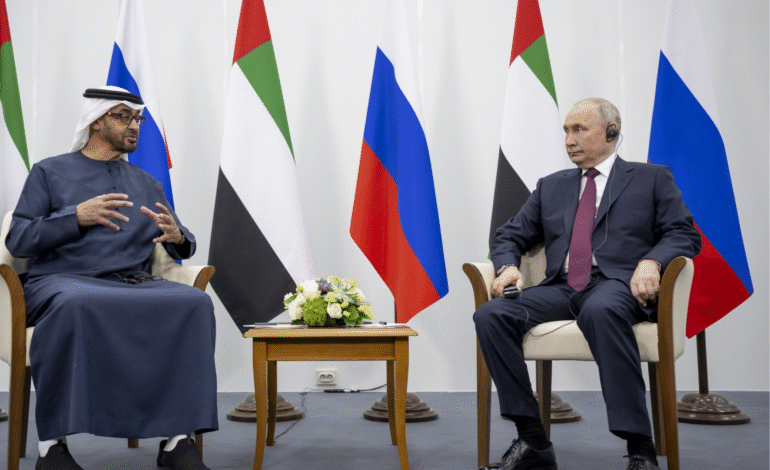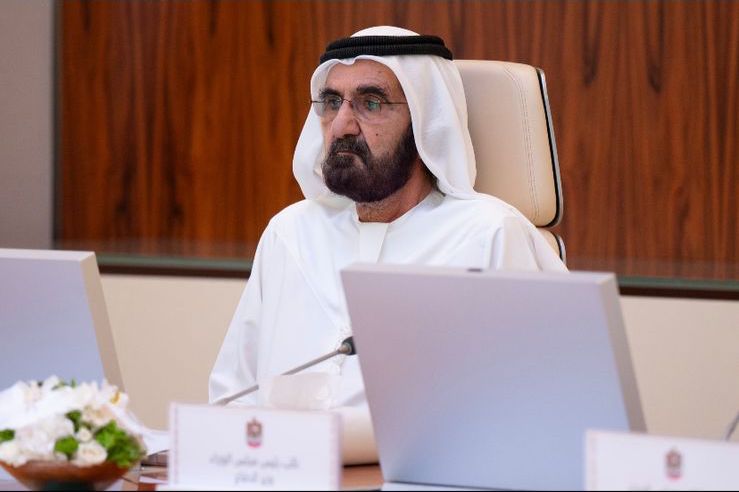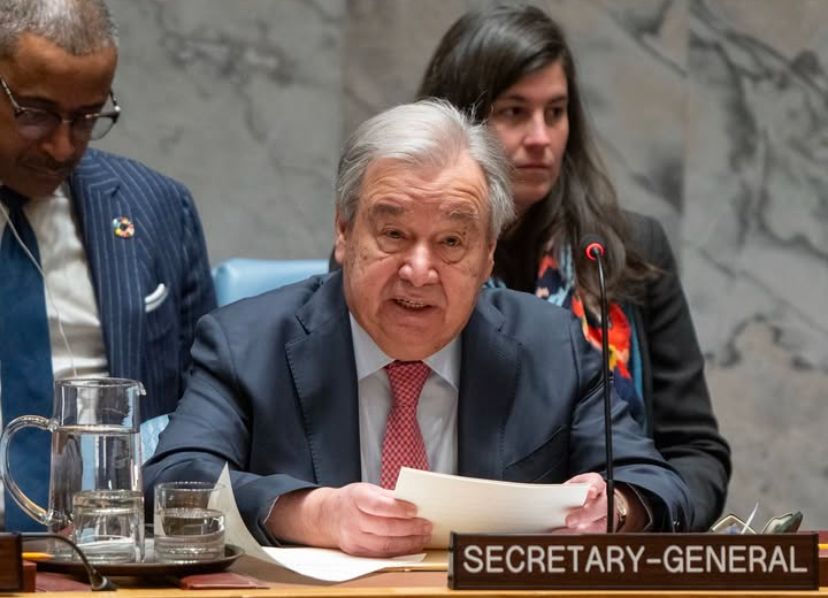UAE President and Russia’s Putin Discuss Regional Tensions and Ties

In a vital diplomatic exchange that reflects deepening ties and shared regional concerns, UAE President His Highness Sheikh Mohamed bin Zayed Al Nahyan and President Vladimir Putin of the Russian Federation held a significant phone call. This conversation, which took place amid escalating unrest in the Middle East, focused on strengthening bilateral strategic cooperation and addressing critical regional and international developments that pose grave threats to security and stability.
The two leaders discussed regional dynamics, emphasized the urgent need for diplomatic solutions, and reaffirmed their nations’ shared commitment to peace and multilateral coordination. Their exchange marks another chapter in the UAE and Russia’s evolving relationship, which spans decades of cooperation in trade, energy, defense, and diplomacy.
A Dynamic Strategic Relationship
The UAE and Russia have cultivated a comprehensive and multifaceted relationship that continues to evolve in response to geopolitical changes. The foundation of their strategic partnership includes robust cooperation in sectors such as oil and gas, defense technologies, investments, nuclear energy, space, and agriculture.
In the context of shifting international alliances and regional power balances, the UAE and Russia’s dialogue reflects a matured, pragmatic partnership. This phone call offered both countries an opportunity to reaffirm this trajectory and to align on key priorities that affect not only their bilateral agenda but the broader regional environment.
For the UAE, Russia represents a vital partner capable of influencing outcomes in some of the most complex global arenas. Similarly, for Russia, the UAE provides access to Gulf security dynamics and a gateway to African and Asian markets. Their mutual interests intersect in efforts to stabilize global energy flows, promote development, and reduce conflict zones through diplomacy.
Heightened Tensions in the Middle East
One of the primary topics addressed by the two leaders was the growing tension in the Middle East. Recent escalations in the region—ranging from military operations to diplomatic rifts—have raised serious concerns over the risk of prolonged instability and its implications on global peace and economic order.
Both Sheikh Mohamed and President Putin expressed concern over the rapid deterioration of regional security. They discussed the serious consequences of continued hostilities and warned against allowing events to spiral into broader conflict. The Middle East, already burdened by years of war and political fragmentation, now faces the added threat of inter-state confrontations that could destabilize the entire region.
By recognizing the scale of the threat, both nations reiterated the need to move away from confrontation and to prioritize crisis management through strategic and peaceful channels. Their discussion pointed to a broader understanding of the interconnectedness of regional stability and global wellbeing.
The Call for Restraint and Diplomacy
Echoing long-standing diplomatic principles, Sheikh Mohamed and President Putin emphasized the urgency of exercising restraint by all parties involved in regional conflicts. The leaders highlighted how reckless military escalations or uncalculated political decisions could deepen divisions and jeopardize not only regional peace but global economic and humanitarian conditions.
They stressed that diplomacy remains the most effective path toward resolution. Dialogue, negotiation, and international coordination were all identified as critical tools in de-escalating current tensions. The two leaders expressed full support for initiatives that prioritize peaceful settlement and inclusive engagement.
Both the UAE and Russia agreed to maintain active dialogue and coordinate their positions through multilateral forums, diplomatic channels, and regional networks to prevent the situation from worsening. Their commitment to diplomacy stands as a model of international responsibility at a time when global consensus is essential.
UAE’s Role in Global Peacebuilding
Under the leadership of President Sheikh Mohamed bin Zayed, the UAE has consistently taken a position of neutrality and constructive engagement on the world stage. Over the past decade, the country has mediated in several regional conflicts and played a pivotal role in promoting peace agreements, humanitarian aid, and multilateral dialogue.
The UAE has supported post-conflict reconstruction in Yemen, played host to peace talks on Libya, facilitated prisoner exchanges, and participated in stabilization efforts across the Horn of Africa and beyond. This reputation for diplomatic balance and reliability positions the UAE as a key actor in easing regional crises.
In this phone call, Sheikh Mohamed reinforced the UAE’s ongoing commitment to peaceful conflict resolution and expressed readiness to work with regional and international partners, including Russia, to reduce tensions through meaningful diplomacy and humanitarian engagement.
Russia’s Global and Regional Influence
Russia, under President Putin, continues to assert itself as a major global power with interests deeply embedded in the Middle East. From its military presence in Syria to its economic partnerships with Gulf countries, Russia’s influence across the region is considerable.
During the call, President Putin emphasized Russia’s interest in supporting all efforts aimed at restoring regional stability. He also offered continued coordination with the UAE on issues of mutual concern. Russia’s foreign policy approach to the Middle East often involves balancing relations with Iran, Israel, and Arab states, and its dialogue with the UAE represents a key stabilizing mechanism.
The leaders’ conversation reinforced the importance of sustaining dialogue, even when global challenges and alignments shift unpredictably. Through this discussion, Russia reaffirmed its intention to pursue a stabilizing role by cooperating with regional powers like the UAE.
Historical Background of UAE–Russia Relations
Formal diplomatic ties between the UAE and Russia date back to 1971, following the UAE’s independence. Over time, relations have expanded significantly. The two countries have signed dozens of bilateral agreements, including strategic memoranda in energy, defense, and technological innovation.
In recent years, high-level visits have reinforced these ties. In 2019, President Putin visited Abu Dhabi and signed major investment and security agreements with UAE leadership. That visit marked a turning point in bilateral relations, signaling a new era of intensified collaboration and shared strategic goals.
The consistent exchange of views on global and regional matters, as illustrated by this recent phone call, is a continuation of the strong diplomatic foundation laid over decades.
Impact on Global Energy Markets
As major players in the global energy sector, both the UAE and Russia have a vested interest in maintaining stability in oil and gas markets. Regional instability in the Middle East has direct implications for global energy supply chains and pricing.
During their conversation, the leaders touched on the indirect impact of current geopolitical tensions on oil production, export routes, and economic partnerships. Both countries are members of OPEC+ and have historically collaborated on oil production quotas to stabilize markets.
A stable Middle East is in their mutual interest, not just for geopolitical reasons but also for maintaining steady economic performance amid turbulent conditions. Their coordination helps balance global energy demands and prevents erratic fluctuations in oil prices due to regional disruptions.
Prospects for Future Cooperation
Beyond the phone call’s immediate context, the discussion opens new doors for closer strategic cooperation between the UAE and Russia. The leaders’ mutual understanding and proactive communication underscore a relationship built on shared visions and strategic alignment.
The UAE and Russia are expected to enhance coordination on key diplomatic initiatives and may pursue deeper collaboration through international platforms such as the United Nations, BRICS, and regional summits. As both countries seek to broaden their roles in global governance and security, their partnership could influence conflict resolution strategies and shape new diplomatic approaches in the Middle East and beyond.








1 Comment
[…] August 7, 2025, UAE President Sheikh Mohamed bin Zayed Al Nahyan met with Russian President Vladimir Putin in Moscow to discuss ways of further strengthening the strategic partnership between the United […]
Comments are closed.